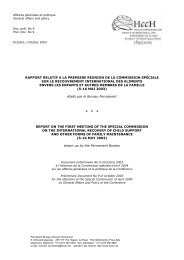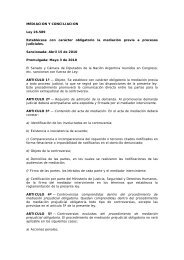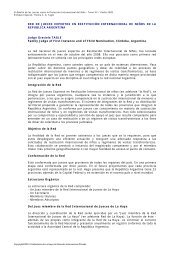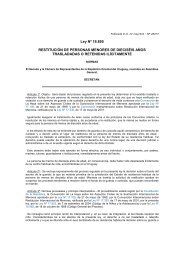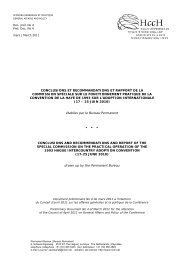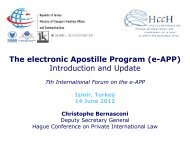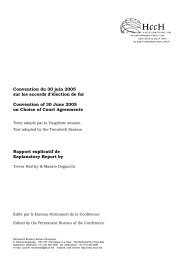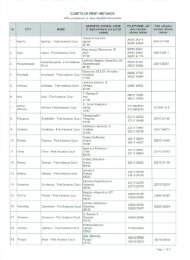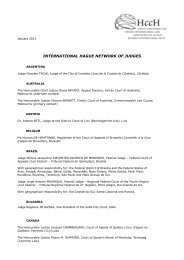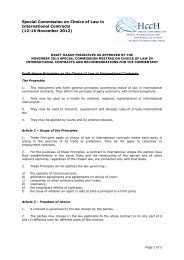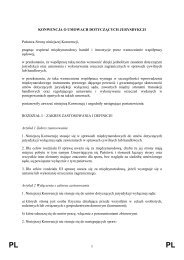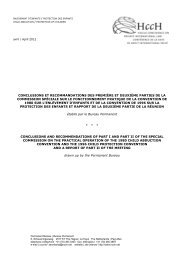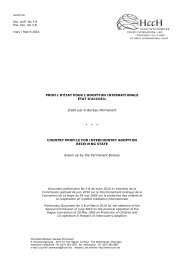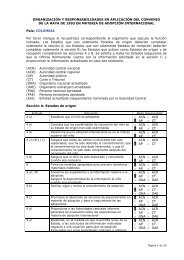aperçu des réponses au questionnaire accompagnant la ... - HCCH
aperçu des réponses au questionnaire accompagnant la ... - HCCH
aperçu des réponses au questionnaire accompagnant la ... - HCCH
You also want an ePaper? Increase the reach of your titles
YUMPU automatically turns print PDFs into web optimized ePapers that Google loves.
Question Réponse / Reply État / State<br />
mode de notification est, selon le droit procédural français, réservé <strong>au</strong>x greffes, et à certaines catégories de<br />
procédures (matière gracieuse, matière prud’homale, convocations en justice …). Aucune difficulté d’interprétation<br />
de l’art. 10a n’a été signalée par les juridictions. Cependant, il convient de rappeler qu’en application <strong>des</strong><br />
dispositions du droit interne français insérées dans l’article 686 du nouve<strong>au</strong> code de procédure civile, est<br />
effectué par l’huissier de justice, le jour même de <strong>la</strong> signification faite <strong>au</strong> parquet ou, <strong>au</strong> plus tard, le<br />
premier jour ouvrable, l’envoi par lettre recommandée avec demande d'avis de réception d’une copie<br />
certifiée conforme de l'acte, à son <strong>des</strong>tinataire. En outre, selon l’article 693 du même code, ces dispositions<br />
doivent être observées à peine de nullité de <strong>la</strong> signification. L’envoi de telles copies d’actes en Suisse a, jusqu’ici,<br />
posé <strong>des</strong> difficultés de façon récurrente, entraînant <strong>des</strong> protestations régulières de <strong>la</strong> part <strong>des</strong> <strong>au</strong>torités suisses qui<br />
arguent du caractère contraire à l’ordre public international, de <strong>la</strong> notification postale sur leur territoire. En effet, <strong>la</strong><br />
Suisse a expressément déc<strong>la</strong>ré s'opposer à l'usage sur son territoire, de <strong>la</strong> voie de transmission prévue par l’art. 10<br />
de <strong>la</strong> Convention. Afin de concilier les exigences respectives <strong>des</strong> lois française et suisse, il a été envisagé à l’occasion<br />
d’une réunion bi<strong>la</strong>térale organisée en mai 2003, sous l’égide du ministère <strong>des</strong> affaires étrangères français, de<br />
mentionner en caractère très apparents sur les copies d’actes transmises par voie postale, qu’il s’agit d’une copie et<br />
que l’original est acheminé selon les règles de notifications applicables. Courant juin 2003, une note a été adressée<br />
en ce sens <strong>au</strong> Président de <strong>la</strong> chambre nationale <strong>des</strong> huissiers de justice, pour être diffusée à l’ensemble <strong>des</strong><br />
professionnels concernés.<br />
L’application de l’art. 10(a) pose de graves problèmes, puisqu’à l’étranger le facteur n’indique presque<br />
jamais <strong>la</strong> date de livraison du pli ni <strong>la</strong> qualité de <strong>la</strong> personne qui le reçoit, alors que pour <strong>la</strong> légis<strong>la</strong>tion italienne<br />
ces conditions sont indispensables pour établir <strong>la</strong> validité de <strong>la</strong> notification.<br />
Please rep<strong>la</strong>ce the <strong>des</strong>cription concerning the Japanese position on Art. 10(a) in the provisional version of the<br />
new practical handbook (page 60) with the following. This change is not substantial one but is to make it to be<br />
understood clearly:<br />
“Japan has not dec<strong>la</strong>red that it objects to the sending of judicial documents, by postal channels, directly to persons<br />
abroad. As the representative of Japan has made it clear at the Special Commission of April 1989 on the operation of<br />
the Convention on the Service of the Documents Abroad and on the Taking of Evidence Abroad, Japan does not<br />
consider that the use of the postal channels for sending judicial documents to persons in Japan constitutes an<br />
infringement of its sovereign power. Nevertheless, as the representative has also indicated, Japan believes that the<br />
sending documents by such a method is not always valid in Japan in view of the benefit of the addressee, even<br />
though Japan has not dec<strong>la</strong>red the objection.”<br />
Par une note du 2 juin 1978, reçue par le Ministère <strong>des</strong> Affaires Etrangères <strong>des</strong> Pays-Bas le 15 juin 1978, le<br />
Luxembourg a retiré une déc<strong>la</strong>ration d’opposition à cette méthode de transmission faite lors de <strong>la</strong> ratification.<br />
De même, <strong>au</strong>cun texte n’interdit le recours à <strong>la</strong> voie postale pour les notifications à l’étranger. L’interprétation et<br />
l’application de cette disposition n’a pas soulevé de problèmes notables en pratique.<br />
In its ruling of 31 May 1996 (NJ 1997, 29), the Dutch Supreme Court ruled that in accordance with Article 4 under 8<br />
of the Dutch Code of Civil Procedure (also Article 55, paragraph 1 of the Dutch Code of Civil Procedure), a letter sent<br />
by registered post can be regarded as having satisfied the conditions of the Convention in as far as it is deemed to<br />
have been sent directly via postal channels within the meaning of Article 10, opening lines and under a, if the letter<br />
sent by registered post is actually received by the addressee living abroad.<br />
In view of the fact that Slovakia raised an objection to this form of service, the provision has not been used in<br />
practice until now. In view of the statements from some States that they do not object to such service<br />
from Slovakia, <strong>des</strong>pite our objection, this form of service may gain on popu<strong>la</strong>rity in the future.<br />
Law 7/2002 issued to approve accedation to the convention contain reservation against methods of service<br />
mentioned in articles 8 and 10.<br />
Italie<br />
Japon<br />
Luxembourg<br />
Pays-Bas<br />
Rép. Slovaque<br />
Koweït<br />
Page 40 of 69



